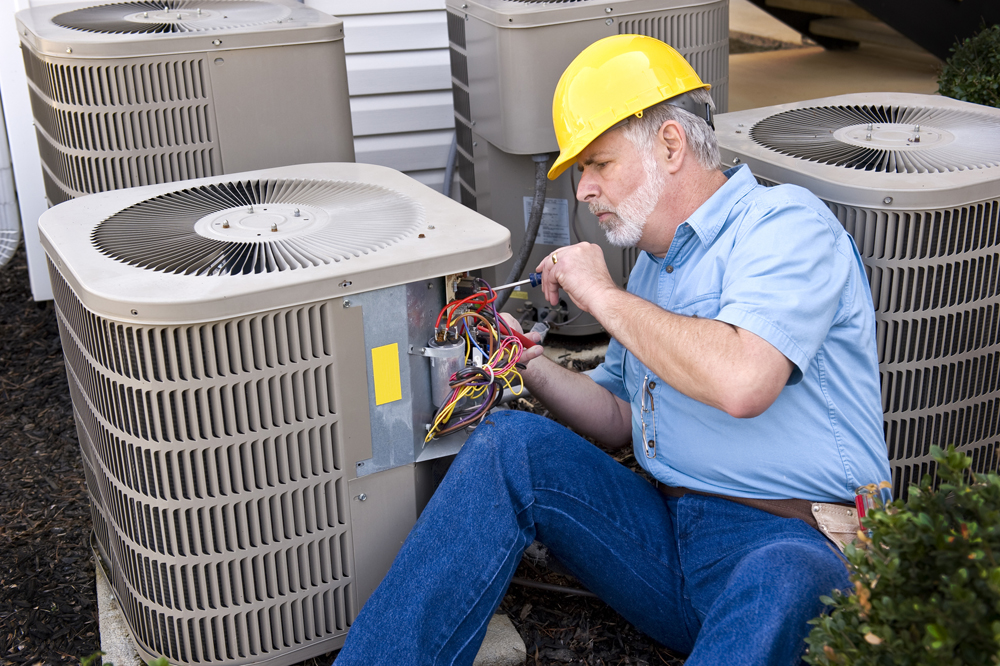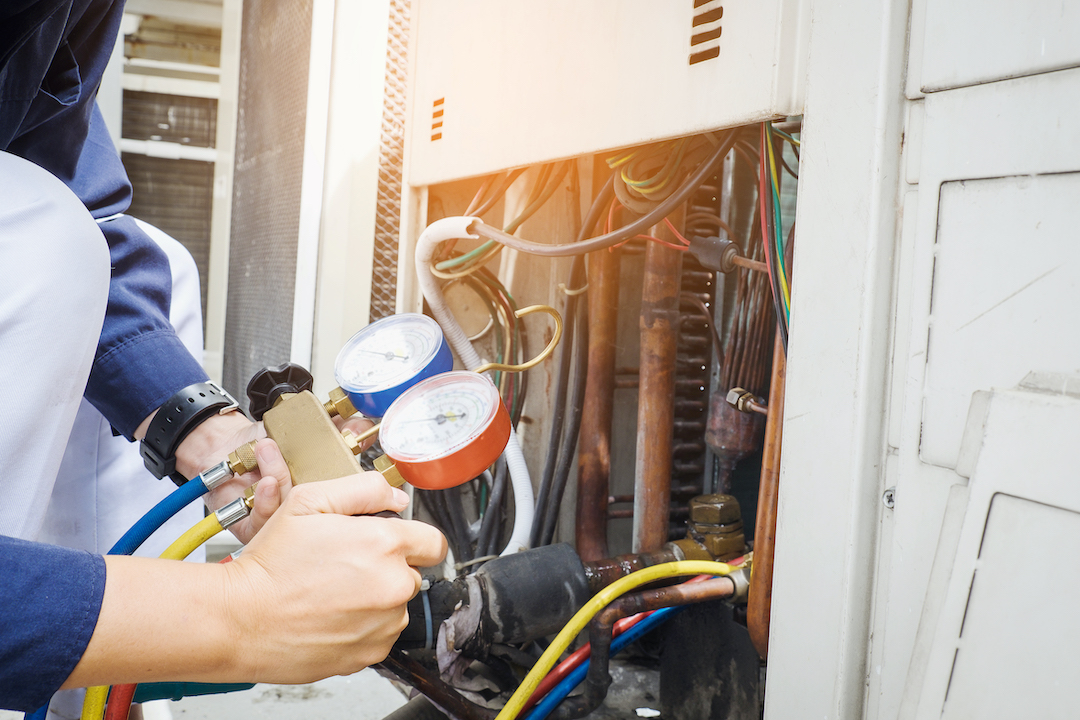The Best Ways to Improve Indoor Air Quality with ductless mini splits
The Best Ways to Improve Indoor Air Quality with ductless mini splits
Blog Article
Selecting In Between a Heat Pump and Heating System: Key Considerations for Your A/c Demands
When reviewing home heating choices for a/c needs, the decision in between a warmth pump and a heating system can be intricate. Each system offers distinct advantages tailored to details environments and power effectiveness objectives. Understanding these distinctions is important for making an educated choice. Trick aspects such as installation costs and ecological influence even more complicate the choice procedure. Which choice truly straightens with one's convenience and sustainability choices? The complying with areas will discover these factors to consider carefully.
Comprehending Heat Pumps: Just How They Work and Their Advantages
While numerous homeowners take into consideration numerous heating alternatives, comprehending just how warm pumps feature and their advantages can greatly affect their choice. Heat pumps operate by transferring warmth instead of generating it. In the winter season, they extract warm from the outdoors air or ground and transfer it inside your home, while in the summer season, they reverse this procedure, cooling the home by eliminating warmth outside. This double capability makes them versatile for year-round climate control.One of the key benefits of heatpump is their energy efficiency. They use considerably less electrical energy compared to standard heating unit, potentially resulting in reduced energy costs (heat pump installation ooltewah tn). Furthermore, heatpump have a smaller sized carbon impact, making them an eco-friendly selection. They also call for less upkeep than standard systems, adding to lasting cost financial savings. Generally, understanding the mechanics and benefits of heatpump can aid home owners make educated choices concerning their home heating and cooling down demands
Exploring Heating Systems: Kinds, Procedure, and Benefits
Heaters can be found in various kinds, consisting of gas, electric, and oil designs, each with unique operational devices. Recognizing these distinctions is essential, as they influence performance and home heating performance. In addition, heaters supply many advantages, such as consistent warm output and dependability in chillier climates.
Sorts of Furnaces
Home heating systems can vary significantly in style and procedure, with heating systems being a prominent choice among home owners. There are numerous kinds of heating systems, each making use of various fuel sources and modern technologies. Gas furnaces prevail, leveraging gas to produce warmth effectively. Electric furnaces, on the other hand, use electrical resistance to generate warmth, commonly preferred for their uncomplicated installment. Oil heating systems, while much less usual, work in areas with restricted gas gain access to (ductless mini splits). In addition, condensing heating systems make the most of energy effectiveness by reusing and catching exhaust gases. Each kind operates via a system of heat exchangers and ductwork to disperse cozy air throughout a home. Comprehending the differences between these furnace types is important for educated HVAC decisions
Advantages of Furnaces
For property owners seeking reputable heat throughout cold months, the advantages of heating systems are significant. Furnaces give constant home heating, making certain even temperatures throughout the home. They are specifically efficient in extreme chilly, commonly exceeding heatpump in icy problems. Various types, including gas, electrical, and oil heating systems, supply adaptability to meet varied demands and preferences.Furnaces additionally have a tendency to have lower first installation expenses contrasted to heatpump, making them a more available choice for lots of. Their robust style adds to a much longer lifespan, with numerous units lasting over 15 years with correct upkeep. Furthermore, contemporary heating systems are usually geared up with advanced modern technology for improved efficiency, which can bring about reduced energy expenses. In general, heaters remain a reputable choice for reliable home heating.

Energy Performance: Contrasting Warm Pumps and Furnaces
When contrasting energy effectiveness in between heatpump and heaters, the Seasonal Energy Effectiveness Ratio (SEER) plays a necessary duty in identifying performance. Additionally, a functional expense analysis discloses the long-term monetary effects of each system. Understanding these aspects can guide house owners in making educated decisions concerning their home heating options.
Seasonal Energy Effectiveness Ratio
Power performance plays an essential duty in the decision-making process between heatpump and heating systems, specifically when thinking about the Seasonal Power Performance Ratio (SEER) This statistics measures the cooling effectiveness of heatpump over a whole cooling period, offering a standard way to evaluate performance. Greater SEER ratings suggest greater energy effectiveness, translating to reduced power usage and decreased utility costs. On the other hand, heaters are typically evaluated utilizing the Annual Gas Application Performance (AFUE) score, which mirrors home heating effectiveness. When comparing these two systems, house owners must focus on SEER rankings for heatpump, as they straight effect total power cost savings and environmental sustainability. A comprehensive understanding of SEER can notably influence the lasting fulfillment and cost-effectiveness of the picked a/c service.
Functional Cost Evaluation
Comprehending the functional costs related to warmth pumps and heaters is crucial for homeowners examining their options. Warm pumps commonly use higher energy effectiveness, converting electric energy right into heat with minimal waste. This causes lower regular monthly utility expenses, specifically in moderate climates. Conversely, conventional furnaces, specifically gas versions, may have reduced ahead of time costs but can sustain higher functional expenditures over time because of fuel prices and effectiveness ratings.Moreover, heatpump can work as both heating and cooling systems, potentially minimizing the demand for separate cooling and heating systems. While initial investments for heatpump might be greater, their lasting financial savings in power efficiency can make them a much more cost-efficient option for several families. Cautious analysis of neighborhood energy prices is necessary to identify the very best alternative.
Installation Costs: What to Expect for every Furnace
Installment expenses for heater hop over to these guys can vary considerably in between heatpump and heating systems, affecting homeowners' decisions. Warm pumps normally have higher in advance installation costs, commonly ranging from $3,500 to $8,000, depending upon the system dimension and complexity of installation. This includes the outside unit, interior handling system, and required ductwork alterations. On the other hand, furnaces have a tendency to have lower preliminary prices, averaging in between $2,500 and $6,000, which can be appealing for budget-conscious home owners. Installation expenditures can raise if considerable ductwork is required.Moreover, the choice of gas kind for furnaces-- all-natural gas, propane, or electrical-- can likewise impact setup expenses. While heatpump offer power efficiency, their initial investment may deter some purchasers. Inevitably, evaluating installation prices along with long-lasting financial savings and effectiveness will certainly aid homeowners in making notified decisions regarding their heater.
Environment Considerations: Which System Carries Out Better in Your Area
How do climate conditions influence the efficiency of heating unit? The performance of heatpump and heaters can vary substantially depending upon the local environment. In modest environments, heatpump stand out by successfully transferring warmth from the outdoors air, making about his them an energy-saving choice. Their efficiency diminishes in incredibly cool temperature levels, where they may struggle to remove enough warmth. On the other hand, furnaces, particularly gas models, supply regular and reputable warmth regardless of exterior conditions, making them more suitable in cooler regions.In areas that experience milder winter seasons, heatpump can run successfully year-round, supplying both cooling and heating. In comparison, areas with rough winter seasons frequently take advantage of the robustness of heating systems. Inevitably, recognizing the neighborhood environment is vital when determining in between a warm pump and a heater, as it straight influences their functional effectiveness and general performance.
Upkeep Requirements: Long-Term Look After Heat Pumps vs. Furnaces
While both heat pumps and heaters need regular maintenance to assure peak performance, their specific demands and treatment regimens differ significantly. Heating systems normally need Website much less regular attention, with yearly evaluations sufficing to examine for gas leaks, tidy filters, and assess overall functionality. Their simpler style often permits straightforward repairs.In contrast, warm pumps demand semiannual upkeep due to their twin duty in heating & cooling. This includes cleaning coils, examining cooling agent levels, and making sure that both the indoor and exterior units work at their finest. Furthermore, heatpump maintenance commonly involves even more complex components, making specialist servicing essential.Neglecting maintenance can lead to diminished performance and boosted power prices for both systems. Ultimately, home owners should take into consideration these long-term care needs when choosing in between a heat pump and a furnace, as positive maintenance can extend the life expectancy and efficiency of either system considerably.
Environmental Effect: Picking a Lasting Home Heating Option
The ecological influence of heater is an important evaluation for property owners looking for lasting alternatives. Heatpump are usually a lot more energy-efficient than typical heating systems, as they move warmth instead than create it, considerably minimizing carbon emissions. By using renewable resource sources, such as air-source or geothermal heatpump, home owners can better lessen their environmental footprint.On the various other hand, all-natural gas heaters emit greenhouse gases and add to air pollution, though they commonly give higher warm outcome. Developments in innovation have led to the growth of high-efficiency heaters that minimize emissions.Ultimately, choosing a heating system includes weighing effectiveness against ecological effect. Home owners are urged to mirror on regional energy sources and incentives for eco-friendly systems, ensuring an option that straightens with both individual comfort and ecological duty. The choice influences not just immediate comfort yet likewise lasting sustainability and ecological health and wellness.
Regularly Asked Concerns
The Length Of Time Do Warm Pumps and Furnaces Commonly Last?
The life expectancy of heatpump usually varies from 15 to 20 years, while heaters can last between 15 to 30 years. Normal maintenance substantially impacts their long life and performance in providing home heating options.
Can I Use a Heat Pump in Incredibly Cold Climates?
Warm pumps can operate in incredibly cold environments, yet their effectiveness diminishes as temperature levels decrease. In such problems, extra home heating resources may be essential to maintain comfy interior temperature levels and guarantee peak performance.

What Is the Sound Degree of Warmth Pumps Versus Furnaces?
The noise levels of heatpump and heaters vary considerably. Usually, heatpump operate even more quietly than traditional heaters, making them preferable for those conscious sound, while heaters might produce louder functional noises during heating cycles.
Are Warm Pumps Suitable for Both Heating and Cooling?
Heat pumps are certainly suitable for both cooling and heating (heat pump installation ooltewah tn). They work by moving warm, giving reliable temperature control year-round, making them a flexible choice for home owners seeking an all-in-one HVAC remedy
What Dimension Furnace Do I Required for My Home?
Determining the proper dimension furnace for a home needs evaluating elements such as square footage, insulation top quality, local climate, and the home's format. Consulting a specialist can ensure an exact analysis and perfect comfort. Warm pumps commonly offer greater energy effectiveness, transforming electric energy right into heat with minimal waste. In modest climates, warm pumps stand out by successfully transferring warmth from the outside air, making them an energy-saving choice. On the other hand, furnaces, particularly gas models, provide trustworthy and constant heat no matter of outside conditions, making them more suitable in chillier regions.In areas that experience milder winters months, heat pumps can operate efficiently year-round, offering both heating and air conditioning. Heat pumps are usually extra energy-efficient than typical furnaces, as they move warm rather than produce it, substantially lowering carbon discharges. By using sustainable energy resources, such as geothermal or air-source heat pumps, home owners can even more minimize their eco-friendly footprint.On the other hand, natural gas heating systems send out greenhouse gases and add to air pollution, though they commonly provide higher heat outcome.
Report this page